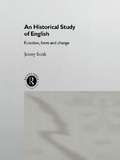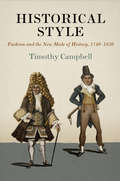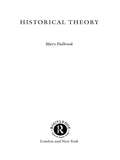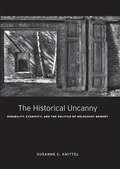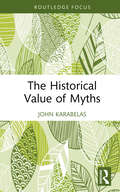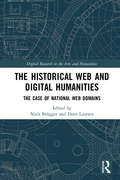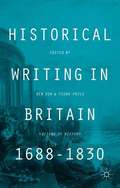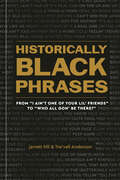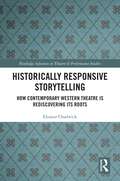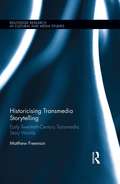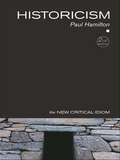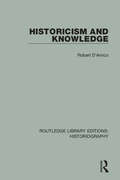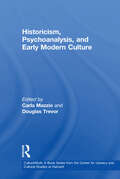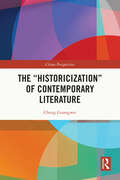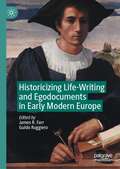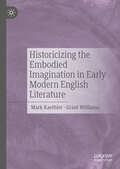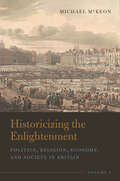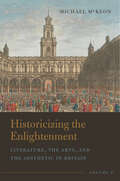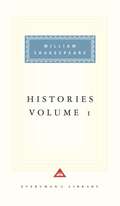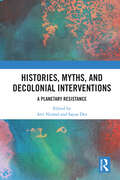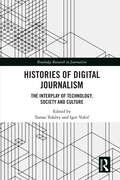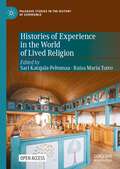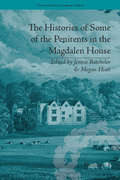- Table View
- List View
An Historical Study of English: Function, Form and Change
by Jeremy SmithThrough his analysis of selected major developments in the history of English, Jeremy Smith argues that the history of the language can only be understood from a dynamic perspective. He proposes that internal linguistic mechanisms for language change cannot be meaningfully explained in isolation or without reference to external linguistic factors. Smith provides the reader with an accessible synthesis of recent developments in English historical linguistics. His book: Looks at the theory and methodology of linguistic historiography . Considers the major changes in writing systems, pronunciation and grammar. Provides examples of these changes, such as the standardisation of spellings and accent and the origins of the Great Vowel Shift Focuses on the origins of two non-standard varieties; eighteenth century Scots and twentieth century British Black English.This book makes fascinating reading for students of English Historical linguistics, and is an original, important and above all, lively contribution to the field.
Historical Style: Fashion and the New Mode of History, 1740-1830 (Material Texts)
by Timothy CampbellHistorical Style connects the birth of eighteenth-century British consumer society to the rise of historical self-consciousness. Prior to the eighteenth century, British style was slow to change and followed the cultural and economic imperatives of monarchical regimes. By the 1750s, however, a growing fashion press extolled, in writing and illustration, the new phenomenon of periodized fashion trends. As fashion fads came in and out of style, and as fashion texts circulated and obsolesced, Britons were forced to confront the material persistence of out-of-date fashions. Timothy Campbell argues that these fashion texts and objects shaped British perception of time and history by producing new curiosity about the very recent past, as well as a new self-consciousness about the means by which the past could be understood.In a panoptic sweep, Historical Style brings together art history, philosophy, and literary history to portray an era increasingly aware of itself. Burgeoning consumer society, Campbell contends, highlighted the distinction between the past and the present, created an expectation of continual change, and forged a sense of history as something that could be tracked through material objects. Campbell assembles a wide range of writings, images, and objects to render this eighteenth-century landscape: commercial dress displays and David Hume's ideas of novelty as historical form; popular illustrations of recent fashion trends and Sir Joshua Reynolds's aesthetic precepts; fashion periodicals and Sir Walter Scott's costume-saturated historical fiction. In foregrounding fashion to trace eighteenth-century historicism, Historical Style draws upon the interdisciplinary, multimedia archival impressions that fashionable dress has left behind, as well as the historical and conceptual resources within the field of fashion studies that literary and cultural historians of eighteenth-century and Romantic Britain have often neglected.
Historical Theory
by Mary FulbrookPractising historians claim that their accounts of the past are something other than fiction, myth or propaganda. Yet there are significant challenges to this view, most notably from postmodernism. In Historical Theory, a prominent historian develops a highly original argument that evaluates the diversity of approaches to history and points to a constructive way forward. Mary Fulbrook argues that all historians face key theoretical questions, and that an emphasis on the facts alone is not enough. Against postmodernism, she argures that historical narratives are not simply inventions imposed on the past, and that some answers to historical questions are more plausible or adequate than others. Illustrated with numerous substantive examples and its focus is always on the most central theoretical issues and on real strategies for bridging the gap between the traces of the past and the interpretations of the present. Historical Theory is essential and enlightening reading for all historians and their students.
Historical Truth and Lies About the Past
by Alan B. SpitzerHistorians have long struggled with the questions of historical relativism, objectivity, and standards of proof and evidence. Intellectual historian Alan Spitzer focuses on the contradiction between theory and practice by presenting case studies of four politically charged debates about the past: the response to the report of the commission chaired by John Dewey that evaluated the accusations made against Leon Trotsky in the Moscow Purge Trials of 1937, the Dreyfus Affair in turn-of-the-century France, the allegations about the extent and meaning of literary critic Paul de Man's complicity with the German occupation forces in wartime Belgium, and Ronald Reagan's justification for his 1987 visit to a German cemetery where Nazi SS officers are buried. Spitzer's argument centers on the ways in which the authority of 'objective' criteria for historical judgment are introduced in politicized disputes about the past, regardless of the theoretical qualification or repudiation of such standards. The higher the political stakes, the more likely the antagonists are to appeal to generally warranted standards of relevant evidence and rational inference. Spitzer's commentary speaks to issues that transcend the specific content of the four cases he discusses.
The Historical Uncanny: Disability, Ethnicity, and the Politics of Holocaust Memory
by Susanne C. KnittelThe Historical Uncanny explores how certain memories become inscribed into the heritage of a country or region while others are suppressed or forgotten. In response to the erasure of historical memories that discomfit a public’s self-understanding, this book proposes the historical uncanny as that which resists reification precisely because it cannot be assimilated to dominant discourses of commemoration.Focusing on the problems of representation and reception, the book explores memorials for two marginalized aspects of Holocaust: the Nazi euthanasia program directed against the mentally ill and disabled and the Fascist persecution of Slovenes, Croats, and Jews in and around Trieste. Reading these memorials together with literary and artistic texts, Knittel redefines “sites of memory” as assemblages of cultural artifacts and discourses that accumulate over time; they emerge as a physical and a cultural space that is continually redefined, rewritten, and re-presented.In bringing perspectives from disability studies and postcolonialism to the question of memory, Knittel unsettles our understanding of the Holocaust and its place in the culture of contemporary Europe.
The Historical Value of Myths
by John KarabelasThis book explores the connection between history and mythology by engaging with myths not as allegories or falsehoods, but as representations of historical experience. Historical approaches to myth are often absent from discussions of mythology, which favour symbolic and psychological interpretations. This analysis traces certain episodes of myths’ complex ancestries, from when their relationship with history could not so easily be severed, to subsequent attempts, which misunderstood myths as confused, undeveloped lenses for humanity to view the world. Drawing on the works of English philosopher R.G. Collingwood and the Romanticism movement, the book argues for the expansion of methodological approaches to myths. It explores the ways in which myths have served as clues for the history of civilization and humanity’s ever-changing complexities. The Historical Value of Myths is an illuminating read for advanced undergraduates, postgraduates, and researchers in the fields of mythology, the philosophy of history, and anthropology.
The Historical Web and Digital Humanities: The Case of National Web Domains (Digital Research in the Arts and Humanities)
by Niels Brügger Ditte LaursenThe Historical Web and Digital Humanities fosters discussions between the Digital Humanities and web archive studies by focussing on one of the largest entities of the web, namely national and transnational web domains such as the British, French, or European web. <P><P>With a view to investigating whether, and how, web studies and web historiography can inform and contribute to the Digital Humanities, this volume contains a number of case studies and methodological and theoretical discussions that both illustrate the potential of studying the web, in this case national web domains, and provide an insight into the challenges associated with doing so. Commentary on and possible solutions to these challenges are debated within the chapters and each one contributes in its own way to a web history in the making that acknowledges the specificities of the archived web. <P><P>The Historical Web and Digital Humanities will be essential reading for those with an interest in how the past of the web can be studied, as well as how Big Data approaches can be applied to the archived web. As a result, this volume will appeal to academics and students working and studying in the fields of Digital Humanities, internet and media studies, history, cultural studies, and communication.
Historical Writing in Britain, 1688–1830
by Ben Dew Fiona PriceHistorical Writing in Britain, 1688-1830 explores a series of debates concerning the nature and value of the past in the long eighteenth century. The essays investigate a diverse range of subjects including art history, biography, historical poetry, and novels, as well as addressing more conventional varieties of historical writing.
Historically Black Phrases: From "I Ain't One of Your Lil' Friends" to "Who All Gon' Be There?"
by jarrett hill Tre'vell AndersonA fun and thoughtful dictionary of Black language you didn&’t know you needed, Historically Black Phrases is a love letter to the Black community and the ways it drives culture.&“This perfect blend of explanation, definition and social commentary will have you laughing while learning.&”—George M. Johnson, New York Times bestselling author of All Boys Aren't Blue and We Are Not BrokenBlack vernacular doesn&’t often get its due—despite its enormous influence on mainstream culture—but Historically Black Phrases is here to give Black language its flowers. A celebration of more than two hundred staples of Black conversation—from church sayings and units of measure to compliments and reprimands—this sharp and witty guide explores the unique importance of Black expression and communication. Historically Black Phrases offers definitions and notable pop culture moments, as well as tips on pronunciation and usage of phrases like &“feelin&’ yourself,&” &“don&’t get it twisted,&” and &“pop off.&” In addition to the phrases, short essays offer insight on different facets of Black language from scholars, entertainers, and pop culture commentators (i.e., everybody and they mama). Authors, journalists, and hosts of the award-winning podcast FANTI, jarrett hill and Tre&’vell Anderson examine each phrase with humor and cultural precision, making Historically Black Phrases a vital ode to how Black language influences the world.
Historically Responsive Storytelling: How Contemporary Western Theatre is Rediscovering its Roots (Routledge Advances in Theatre & Performance Studies)
by Eleanor ChadwickThis book explores the notion that the emergent language of contemporary theatre, and more generally of modern culture, has links to much earlier forms of storytelling and an ancient worldview. This volume looks at our diverse and amalgamative theatrical inheritance and discusses various practitioners and companies whose work reflects and recapitulates ideas, approaches, and structures original to theatre’s ritual roots. Drawing together a range of topics and examples from the early Middle Ages to the modern day, Chadwick focuses in on a theatrical language which includes an emphasis on the psychosomatic, the non-linear, the symbolic, the liminal, the collective, and the sacred. This interdisciplinary work draws on approaches from the fields of anthropology, philosophy, historical and cognitive phenomenology, and neuroscience, making the case for the significance of historically responsive modes in theatre practice and more widely in our society and culture.Eleanor
Historicising Transmedia Storytelling: Early Twentieth-Century Transmedia Story Worlds (Routledge Research in Cultural and Media Studies)
by Matthew FreemanTracing the industrial emergence of transmedia storytelling—typically branded a product of the contemporary digital media landscape—this book provides a historicised intervention into understandings of how fictional stories flow across multiple media forms. Through studies of the storyworlds constructed for The Wizard of Oz, Tarzan, and Superman, the book reveals how new developments in advertising, licensing, and governmental policy across the twentieth century enabled historical systems of transmedia storytelling to emerge, thereby providing a valuable contribution to the growing field of transmedia studies as well as to understandings of media convergence, popular culture, and historical media industries.
Historicism (The New Critical Idiom)
by Paul HamiltonHistoricism is the essential introduction to the field, providing its readers with the necessary knowledge, background and vocabulary to apply it in their own studies. Paul Hamilton's compact and comprehensive guide: * explains the theory and basics of historicism* presents a history of the term and its uses* introduces the reader to the key thinkers in the field, from ancient Greece to modern times* considers historicism in contemporary debates and its relevance to other modes of criticism, such as feminism and post-colonialism* contains an extensive bibliography of further reading.
Historicism and Knowledge (Routledge Library Editions: Historiography)
by Robert D'AmicoA critical account of the case for historicism from Popper to Foucault, this volume, originally published in 1989, shows the viability of an historicist account of knowledge by replying to traditional objections and the need for defenses of realism and reference at the heart of most alternatives to historicism. The book provides insights to those in philosophy as well as literary criticism, intellectual history, history of science, and cultural criticism.
Historicism, Psychoanalysis, and Early Modern Culture (CultureWork: A Book Series from the Center for Literacy and Cultural Studies at Harvard)
by Carla Mazzio Douglas TrevorFirst published in 2000. Did people in early modern Europe have a concept of an inner self? Carla Mazzio and Douglas Trevor have brought together an outstanding group of literary, cultural, and history scholars to answer this intriguing question. Through a synthesis of historicism and psychoanalytic criticism, the contributors explore the complicated, nuanced, and often surprising union of history and subjectivity in Europe centuries before psychoanalytic theory. Addressing such topics as "fetishes and Renaissances," "the cartographic unconscious," and "the topographic imaginary," these essays move beyond the strict boundaries of historicism and psychoanalysis to carve out new histories of interiority in early modern Europe.
The “Historicization" of Contemporary Literature (ISSN)
by Cheng GuangweiThis book provides a concise introduction to the intellectual trends in contemporary Chinese literature from the 1950s to the 1990s and the influence of overseas Sinology.The turbulent period of the second half of the 20th century in China witnessed a significant societal shift from a revolutionary to an economic focus. This transformation introduced and stimulated various ideas, reshaping public thought and reconstructing the historical landscape of contemporary Chinese literature. This book explores the response and self-exploration of domestic literary studies of the period, which were heavily influenced by the Western academic tradition and overseas Sinology studies. It examines critical phenomena, figures, and events in this context. The author's narrative vividly illustrates the interplay and dialogue of factors such as revolution, reform and opening up, and the rise of literature in the 1980s and 1990s. Combining the methodologies of literary and social history, and integrating personal historical experience with rigorous academic methods, this book provides a unique research framework for revisiting the cultural scene of the period.The title will appeal to scholars and students of contemporary Chinese literature and history. It will also attract general readers interested in Chinese culture and society in the 1980s and 1990s.
Historicizing Colonial Nostalgia
by Patricia M.E. LorcinThis illuminating study of European women's narratives in colonial Algeria and Kenya argues that nostalgia was not a post-colonial phenomenon but was embedded in the colonial period. Patricia M. E. Lorcin explores the distinction between imperial nostalgia, associated with the loss of power that results from the loss of empire, and colonial nostalgia, associated with loss of socio-cultural standing—in other words, loss of a certain way of life. This distinction helps to make women's discursive role an important factor in the creation of colonial nostalgia, due to their significant contribution to the establishment of a European colonial environment.
Historicizing Life-Writing and Egodocuments in Early Modern Europe
by James R. Farr Guido RuggieroThis volume historicizes the study of life-writing and egodocuments, focusing on early modern European reflections on the self, self-fashioning, and identity. Life-writing and the study of egodocuments currently tend to be viewed as separate fields, yet the individual as a purposive social actor provides significant common ground and offers a vehicle, both theoretical and practical, for a profitable synthesis of the two in a historical context. Echoing scholars from a wide-range of disciplines who recognize the uncertainty of the nature of the self, these essays question the notion of the autonomous self and the attendant idea of continuous identity unfolding in a unified personality. Instead, they suggest that the early modern self was variable and unstable, and can only be grasped by exploring selves situated in specific historical and social/cultural contexts and revealed through the wide range of historical documents considered here. The three sections of the volume consider: first, the theoretical contexts of understanding egodocuments in early modern Europe; then, the practical ways egodocuments from the period may be used for writing life-histories today; and finally, a wider range of historical documents that might be added to what are usually seen as egodocuments.
Historicizing the Embodied Imagination in Early Modern English Literature
by Grant Williams Mark KaethlerCommonly used as a rallying cry for general approaches to literary studies, the imagination has until recently been overwritten with romantic and modernist inflections that impede our understanding of literature’s intimate involvement in early modern cognition. To recover the pre-Cartesian imagination, this collection of essays takes a historicist approach by situating literary texts within the embodied and ensouled faculty system. Image-making and fantasizing were not autonomous activities but belonged to a greater cognitive ecosystem, which the volume’s four sections reflect: “The Visual Imagination,” “Sensory and Affective Imaginings,” “Artifice and the Mnemonic Imagination,” and “Higher Imaginings.” Together they accentuate the imagination’s interdependency and friction with other faculties. Ultimately, the volume’s attention to the embodied imagination gives scholars new perspectives on literary and image production in the writings of Spenser, Shakespeare, Donne, and their contemporaries.
Historicizing the Enlightenment, Volume 1: Politics, Religion, Economy, and Society in Britain
by Michael McKeonThe Enlightenment has been blamed for some of the most deadly developments of modern life: racism and white supremacy, imperialist oppression, capitalist exploitation, neoliberal economics, scientific positivism, totalitarian rule. These developments are thought to have grown from principles that are rooted in the soil of the Enlightenment: abstraction, reduction, objectification, quantification, division, universalization. Michael McKeon’s new book corrects this defective view by historicizing the Enlightenment--by showing that the Enlightenment has been abstracted from its history. From its past: critics have ignored that Enlightenment thought is a reaction against deadly traditions that precede it. From its present: the Enlightenment extended its reactive analysis of the past to its own present through self-analysis and self-criticism. From its future: much of what’s been blamed amounts to the failure of its posterity to sustain Enlightenment principles. To historicize the Enlightenment requires that we conjure what it was like to live through the emergence of concepts and practices that are now commonplace—society, privacy, the public, the market, experiment, secularity, representative democracy, human rights, social class, sex and gender, fiction, the aesthetic attitude. McKeon’s book argues the continuity of Enlightenment thought, its consistency and integrity across this broad range of conceptual domains. It also shows how the Enlightenment has shaped our views of both tradition and modernity, and the revisionary work that needs to be done in order to understand our place in the future. In the process, Historicizing the Enlightenment exemplifies a distinctive historiography and historical method. Published by Bucknell University Press. Distributed worldwide by Rutgers University Press.
Historicizing the Enlightenment, Volume 2: Literature, the Arts, and the Aesthetic in Britain
by Michael McKeonEnlightenment critics from Dryden through Johnson and Wordsworth conceived the modern view that art and especially literature entails a double reflection: a reflection of the world, and a reflection on the process by which that reflection is accomplished. Instead “neoclassicism” and “Augustanism” have been falsely construed as involving a one-dimensional imitation of classical texts and an unselfconscious representation of the world. In fact these Enlightenment movements adopted an oblique perspective that registers the distance between past tradition and its present reenactment, between representation and presence. Two modern movements, Romanticism and modernism, have appropriated as their own these innovations, which derive from Enlightenment thought. Both of these movements ground their error in a misreading of “imitation” as understood by Aristotle and his Enlightenment proponents. Rightly understood, neoclassical imitation, constitutively aware of the difference between what it knows and how it knows it, is an experimental inquiry that generates a range of prefixes—“counter-,” “mock-,” “anti-,” “neo-”—that mark formal degrees of its epistemological detachment. Romantic ideology has denied the role of the imagination in Enlightenment imitation, imposing on the eighteenth century a dichotomous periodization: duplication versus imagination, the mirror versus the lamp. Structuralist ideology has dichotomized narration and description, form and content, structure and history. Poststructuralist ideology has propounded for the novel a contradictory “novel tradition”—realism, modernism, postmodernism, postcolonialism—whose stages both constitute a sequence and collapse it, each stage claiming the innovation of the stage that precedes it. Published by Bucknell University Press. Distributed worldwide by Rutgers University Press.
Histories: Volume 1 (Everyman's Library)
by William Shakespeare Sylvan BarnetShakespeare's histories--containing within their crowded tableaux all of the tragedies, confusions, and beauties of human life--are not only drama of the highest order. They also serve as windows through which generations have made themselves familiar with crucial episodes in English history. Included are: Henry VI, Parts 1, 2, and 3; Richard III; and King John.
Histories, Myths and Decolonial Interventions: A Planetary Resistance
by Arti Nirmal Sayan DeyThis book explores postcolonial myths and histories within colonially structured narratives which persist and are carried in culture, language and history in various parts of the world. It analyses constructions of identities, stereotypes and mythical fantasies in post-colonial society. Exploring a wide range of themes including the appropriation and use of language, myths of decolonialization and nationalism and the colonial influence on systems of academic knowledge, the book focuses on how these myths reinforce, subvert and appropriate colonial binaries for the articulation of the post-colonial self. With essays which study narratives of emigrants in Argentina, the colonial mythology in the Dodecanese in Italy, and the mythico-narratives of island insularity in contemporary Sri Lanka among others, this volume emphasizes the role of indigenous studies in building a postcolonial consciousness. This book will be of interest to scholars and researchers of post-colonial studies, cultural studies, literature, history, political science and sociology.
Histories of Digital Journalism: The Interplay of Technology, Society and Culture (Routledge Research in Journalism)
by Tamas Tofalvy Igor VobičBuilding on the momentum of the recent “historical turn” in digital media and Internet studies, this volume explores how digital journalism has developed from a historical perspective. With contributions from established and emerging scholars from Europe, Asia, South and North America, the book investigates not only how established journalistic systems transformed in the early days of digital but how the structural, technological, and cultural changes induced by digitization have reconfigured the trajectory of journalism.The book argues in support of three main claims. The first is that emphasis should be given to the plurality of histories instead of one single digital journalism history, thereby acknowledging the complexities, interactions of social relations, cultural traditions, power configurations, and technological changes that have shaped journalism and digitization. The second is the decentralization and decolonization of digital journalism histories. The third refers to the need to highlight and demonstrate the idea that the evolution of digital journalism should be viewed as the co-construction of the social and technological realms.With theoretical and methodological reflections on historicizing digital journalism along with original case studies or comparative inquiries into the phenomena over the decades-long digital revolution of journalism, this volume will shape the nascent field of digital journalism history and start a global critical exchange of various approaches to and aspects of historicizing digital journalism. As such, it will interest scholars and students of digital journalism, journalism history, digital media, Internet studies, and technology studies.
Histories of Experience in the World of Lived Religion (Palgrave Studies in the History of Experience)
by Raisa Maria Toivo Sari Katajala-Peltomaa'At a historic moment, when religion shows all its social and political strength in various post-modern societies around our globe, this fascinating collection of studies from the Middle Ages to twentieth-century Europe demonstrates all the richness and innovative force of investigating individual and shared experiences when questioning the cultural, political and social place of religion in society. It also makes known in English the work of a series of Finnish historians elaborating together a pioneering vision of the notion of experience in the discipline of history.'- Piroska Nagy, Université du Québec à Montréal, Canada This open access book offers a theoretical introduction to the history of experience on three conceptual levels: everyday experience, experience as process, and experience as structure. Chapters apply 'experience' to empirical case studies, exploring how people have made and shared their religion through experience in history. This book understands experience as a simultaneously socially constructed and intimately personal process that connects individuals to communities and past to future, thereby forming structures that create and direct societies. It represents the crossroads of a new field of the history of experience, and an established tradition of the history of lived religion. Chapters offer a longue durée view from the fourteenth-century heretics, via experiences of miracle, madness, sickness, suffering, prayer, conversion and death, to the religious artisanship of soldiers in the Second World War frontlines. It concentrates on Northern Europe, but includes materials from Italy, France and United Kingdom.
The Histories of Some of the Penitents in the Magdalen House (Chawton House Library: Women's Novels)
by Jennie Batchelor Megan HiattFirst published in 1759, this novel aims to promote the cause of the Magdalen House, a charity which sought to rehabilitate prostitutes by fitting them for a life of virtuous industry. It challenges long-standing prejudices against prostitutes by presenting them as victims of inadequate education, male libertinism and sexual double standards.
